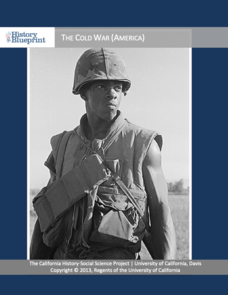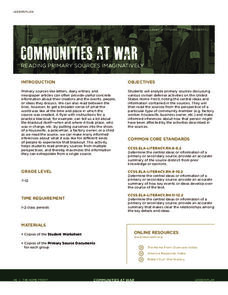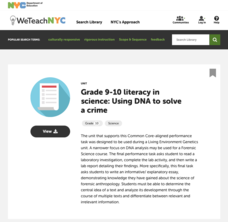Curated OER
French Revolution Unit Plan
"Let them eat cake" are the famous words attributed to Marie Antoinette, but what really caused the French Revolution? The unit plan provides 20 lessons including the worksheets needed for a complete study of the French Revolution. Young...
New York State Education Department
Global History and Geography Examination: June 2012
Want to find out how much class members really know about history? A copy of a New York state test assesses scholars' knowledge of world geography and history in a multi-format test that includes multiple choice and essay items. The...
New York State Education Department
Global History and Geography Examination: June 2013
Is it time to improve test-taking skills? The assessment is a copy of a state test for pupils to practice strategies for taking exams. It covers subjects such as the Chinese Dynasty's and ancient Indian history. It is divided into...
New York State Education Department
Global History and Geography Examination: June 2014
Want to test pupils' knowledge of world events? The assessment addresses global history, such as the ideas of the enlightenment, trade, and geography in five different sections. Pupils answer multiple choice, document-based items, and...
New York State Education Department
US History and Government Examination: January 2015
Gauge pupils' knowledge of US history and government by using a standardized test. Scholars use a previous exam to practice their test-taking skills. The resource contains essay questions, multiple choice questions, and primary source...
New York State Education Department
US History and Government Examination: June 2015
How much do classmates know about US history and government? Take advantage of a standardized test to assess individuals' knowledge. Scholars practice multiple choice and essay questions to help them prepare for state tests.
PBS
Extranjeros and Expansion
A three-part lesson gives light to the Unites States expansion from the view of Texans, New Mexicans, and Californians. Through videos and written activities, scholars work collaboratively to research specific individuals and their...
PBS
Latino Americans Share Their Experiences
Three Latino Americans are the focus of an interactive that spotlights their accomplishments. Scholars get to know Lin-Manuel Miranda, Judy Reyes, and José Hernández through short informative text and videos. Participants read, take...
University of California
The Cold War (America)
The Cold War—with its roots in World War II—impacts the world today. Using an extensive curriculum, scholars consider its impact through primary sources, including speeches and propaganda, as well as other skills-enhancing activities. An...
Syracuse University
American Industrial Revolution
While the Industrial Revolution may have fueled America's rise to the top of world markets, the child laborers often faced dangerous conditions. Using primary source images and other information, scholars consider what these children...
Library of Congress
The Harlem Renaissance
The Harlem Renaissance brought forth many American art forms including jazz, and the writings of Zora Neale Hurston and Langston Hughes. Using a carefully curated set of documents from the Library of Congress, pupils see the cultural...
PBS
Stereotypes vs. Statistics (Grades 9-12)
What is a common stereotype people may think about you; is it true? Using a thought-provoking lesson, high schoolers analyze common stereotypes of the Latino-American population versus statistical data. Scholars review data and have the...
National WWII Museum
Communities at War: Reading Primary Sources Imaginatively
Uncle Sam wants you to support the troops. Learners use an engaging lesson plan to analyze primary and secondary sources to discover what life was really like for American citizens at home during WWII. Pupils complete worksheets, group...
PBS
A Time and Place: The Importance of Setting in To Kill a Mockingbird
A strong community acts as a family during difficult times. The evidence for the family aspects of Maycomb is abundant in Harper Lee's To Kill a Mockingbird, and it is the focus of a lesson plan on the importance of setting as it relates...
Digital Public Library of America
Teaching Guide: Exploring To Kill a Mockingbird
Harper Lee's To Kill a Mockingbird, considered by many to be a seminal piece of American literature, contains many complex literary themes that carry through United States history. Use a series of discussion questions and classroom...
Ford's Theatre
How Perspective Shapes Understanding of History
The Boston Massacre may be an iconic event in American history, but perhaps the British soldiers had another point of view. Using primary sources, including reports from Boston newspapers and secondary sources from the British...
Syracuse University
Women's Suffrage Movement
Women gained the right to vote in the twentieth century, but the fight for equality dates back centuries. Using an invitation to an 1874 suffrage convention, eager historians consider the motivations behind supporters of the suffrage...
Syracuse University
Harlem Renaissance
The music and literature of the Harlem Renaissance defined American culture, including its poetry. Using a poem from the period, individuals explore its musical qualities and how it is reflective of the period. Then, they use what they...
University of Texas
Understanding Migration
Human migration—often the result of push and pull factors—sometimes has dramatic outcomes for both those leaving their homelands and the host countries. Using a variety of case studies, learners consider those issues. Then, by completing...
National WWII Museum
Women and the War: Supporting Historical Interpretations
Rosie the Riveter may be an iconic image from World War II, but not all historians agree on how the conflict affected women in the workplace. Individuals evaluate the writings of well-known historians on the topic, and then decide: Was...
National WWII Museum
Rationing by the Numbers: Quantitative Data as Evidence
What was it like to live on wartime rations in the United States during World War II? Young historians find out by exploring how those on the home front bought food thanks to the ration system. Other data includes statistics on car sales...
Pixton Comics Inc.
Elements of an Epic
Mythic heroes, gods and goddesses, and epic tales come alive as young artists craft their own graphic novel or mind map for classic epics, including The Odyssey, Beowulf, Harry Potter, and Star Wars, identifying the six elements of every...
Literacy Design Collaborative
Elie Wiesel's Acceptance Speech Analysis
Elie Wiesel's Nobel Prize Acceptance speech provides young historians with an opportunity to demonstrate their ability to use evidence from the speech. They work together to analyze how Wiesel uses rhetorical devices and syntax to...
New York City Department of Education
Grade 9-10 Literacy in Science: Using DNA to Solve a Crime
Scholars become detectives and use science to solve a crime! A complete unit introduces DNA and includes hands-on activities that have learners model DNA and extract it from different food types. A culminating activity challenges...

























